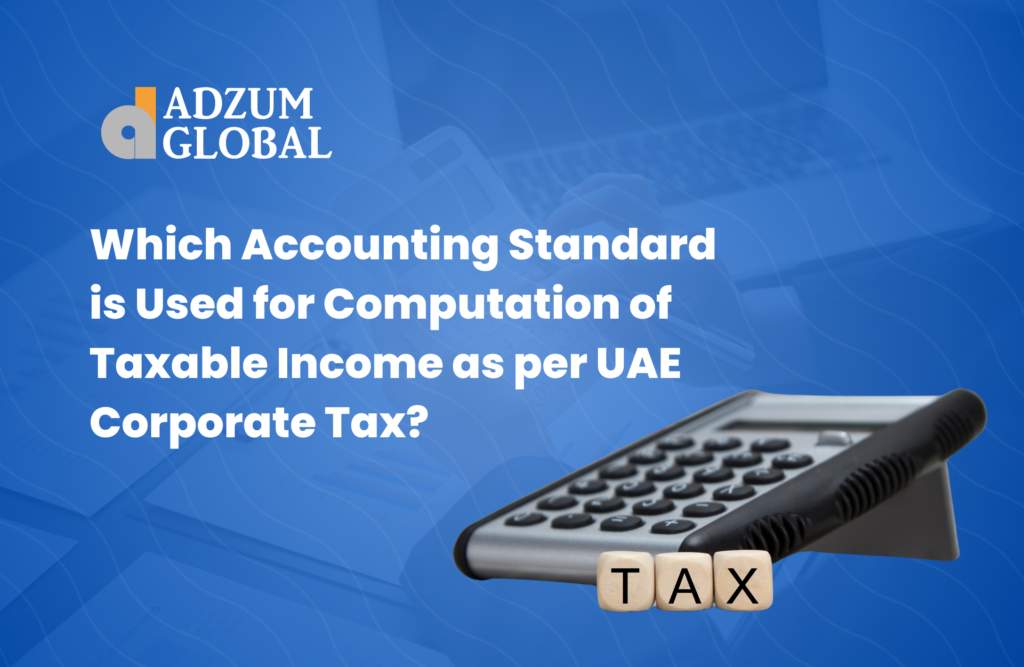Which Accounting Standard is Used for Computation of Taxable Income as per UAE Corporate Tax?


Introduction
Computation of taxable income is a fundamental process for businesses operating in the UAE. It is essential to understand how accounting standards guide this process, as they provide the foundation for preparing financial statements and determining taxable income. The UAE Corporate Tax regime, introduced under Federal Decree-Law No. 47 of 2022, emphasizes adherence to specific accounting standards to ensure accuracy, consistency, and compliance.
Applicable Accounting Standards
Ministerial Decision No. 114 of 2023 provides clarity on the accounting standards to be applied for the computation of taxable income. Article (4) of this decision outlines the following:
- International Financial Reporting Standards (IFRS): All taxable persons in the UAE must apply IFRS when preparing their financial statements for corporate tax purposes. IFRS is a globally recognized accounting standard, ensuring transparency and uniformity in financial reporting.
- IFRS for Small and Medium-sized Entities (SMEs): Taxable persons deriving revenue not exceeding AED 50,000,000 (fifty million United Arab Emirates dirhams) annually may apply IFRS for SMEs. This standard simplifies reporting for smaller entities, balancing compliance with practicality.
- Cash Basis of Accounting: Entities with revenue below AED 3,000,000 or those in exceptional circumstances (subject to Federal Tax Authority approval) may prepare financial statements using the cash basis of accounting. This provision is outlined in Article (2) of the Ministerial Decision.
Priority of the Decree-Law Over Accounting Standards
A key principle governing the computation of taxable income is the precedence of the Decree-Law over accounting standards. Clause (7) of Article 20 of the Decree-Law states:
“In the case of any conflict between the provisions of this Decree-Law and the applicable accounting standards, the provisions of this Decree-Law shall prevail to that extent.”
This ensures that where discrepancies exist between IFRS or IFRS for SMEs and the UAE Corporate Tax Law, the provisions of the law will take precedence. This principle maintains the integrity of the tax regime and eliminates ambiguity.
Taxable Income and Adjustments
Taxable income is primarily calculated based on book profit, which is derived from the financial statements prepared under the applicable accounting standards. However, adjustments are made to the book profit to arrive at the taxable income, as required by the UAE Corporate Tax Law. These adjustments include:
- Exempt Income: Certain types of income, such as qualifying dividends and capital gains from qualifying shareholdings, are excluded from taxable income.
- Disallowed Expenses: Specific expenses that are not deductible for tax purposes, such as fines, penalties, and certain provisions, are added back to the book profit.
- Allowable Deductions: Certain expenses are deductible for tax purposes, including depreciation and amortization calculated as per the tax regulations, not necessarily in line with accounting standards.
- Tax Relief and Loss Adjustments: Taxable income is adjusted for carry-forward tax losses and group relief provisions as allowed under the law.
Importance of Understanding the Applicable Standards
The accurate computation of taxable income requires businesses to fully grasp the accounting standards applicable to their size and operations. Misapplication of standards can result in compliance issues, financial penalties, and reputational damage. Moreover, the choice between IFRS and IFRS for SMEs significantly influences the preparation of financial statements, particularly in areas such as revenue recognition, asset valuation, and expense reporting.
Conclusion
The computation of taxable income in the UAE is governed by a combination of internationally accepted accounting principles and the specific provisions of the UAE Corporate Tax Law. Businesses must align their financial reporting practices with IFRS or IFRS for SMEs, depending on their revenue thresholds, while ensuring compliance with the overriding provisions of the Decree-Law. A clear understanding of these standards not only ensures compliance but also contributes to better financial management and decision-making.

